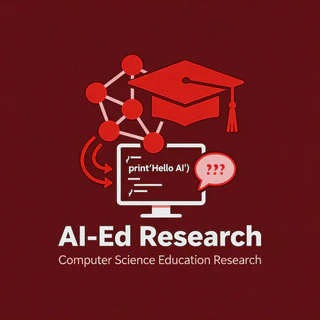Artificial Intelligence for CS Education
 Image credit: Perplexity AI
Image credit: Perplexity AIEmpowering the next generation of programmers requires intelligent systems that not only evaluate code but also teach, guide, and inspire. This research explores how Artificial Intelligence (AI), ranging from statistical models such as Large Language Models (LLMs) to formal reasoning systems like Maximum Satisfiability (MaxSAT)-based approaches, can transform computer science education by providing personalised feedback, automated tutoring, and scalable assessment.
Our goal is to design AI-driven tools that help students develop a deeper conceptual understanding of programming and software engineering, while supporting instructors in delivering fair, consistent, and insightful evaluations.
Teaching computer science effectively requires more than grading correctness, it demands helping students understand why their code behaves as it does. As programming education scales to hundreds or thousands of learners, providing this level of personalised, conceptual feedback becomes increasingly difficult.
By combining neural adaptability with symbolic precision, we aim to bridge the gap between automation and understanding. These AI systems can assess student submissions, locate bugs, explain misconceptions, and even propose guided repairs, helping students learn not just to program, but to think like computer scientists.
Our ongoing projects investigate this vision across multiple levels of abstraction:
- developing scalable automated assessment platforms,
- integrating formal reasoning for accurate and constructive feedback,
- exploring AI-driven program repair as an educational aid, and
- building domain-specific systems for logic programming and beyond.
Together, these efforts define a new direction for AI in computer science education: one where intelligent systems act not as graders, but as collaborative mentors, empowering learners through insight, explanation, and guided exploration.
🧩 AI-Powered Automated Assessment for Programming Education
GitSEED is a language-agnostic automated assessment platform designed for Programming and Software Engineering courses, tightly integrated with GitLab.
Students interact with GitSEED directly through GitLab, allowing them to master fundamental tools such as git while receiving personalised, automated feedback on assignments and projects.
GitSEED’s modular pipeline enables instructors to easily integrate a wide range of AI, and verification-based tools, from memory leak detection to fault localisation and program repair, to tailor feedback according to each course’s learning objectives.
Our experiments, conducted across multiple university courses, show that GitSEED improves student engagement and supports deeper learning outcomes by providing immediate, actionable feedback.
GitSEED’s flexibility makes it a powerful educational framework, capable of unifying AI-driven feedback, automated testing, and formal reasoning tools into a single pedagogical ecosystem.
🧠 Using Formal Reasoning to Enhance Educational Feedback
CFaults is a MaxSAT-based fault localisation tool that identifies the precise source of errors in C programs.
In Spring 2024, we integrated CFaults with GitSEED in a first-year undergraduate programming course. The tool automatically analysed students’ submissions, pinpointing likely faulty statements and generating error hints as structured feedback.
Survey results showed that 69% of students found these hints helpful in understanding and correcting their mistakes. The feedback promoted self-directed learning and conceptual understanding, demonstrating that formal reasoning methods can play a key educational role alongside traditional assessment techniques.
Overall, this study highlighted CFaults’ potential as an intelligent tutoring aid, using rigorous reasoning to guide students in developing correct and robust code.
🔧 Semantic Automated Program Repair for Learning
We developed MENTOR, a semantic automated program repair (APR) framework aimed at supporting introductory programming education.
MENTOR automatically analyses incorrect student submissions, validates repairs through a test suite, and either provides a corrected version of the program or highlights faulty statements using CFaults.
By combining symbolic reasoning with repair synthesis, MENTOR enables fine-grained, interpretable feedback that helps students not only fix their code but also understand why it was incorrect.
This system embodies the broader vision of explainable AI for education, bridging the gap between automation and human understanding.
🧮 Automated Assessment for Logic Programming
ProHelp extends the GitSEED ecosystem to Prolog, providing a specialised assessment platform for logic programming education.
ProHelp integrates multiple feedback mechanisms, including:
- automated testing,
- typo correction suggestions, and
- validation of implementation strategies.
A mixed-methods study with 365 undergraduate students over a 9-week course demonstrated that ProHelp improved learning efficiency and supported students in adopting better problem-solving strategies.
By embedding ProHelp within the GitSEED infrastructure, we established a cohesive AI-assisted learning environment that spans from imperative to declarative programming paradigms.
🚀 Towards AI Tutors that Teach How to Think
Taken together, these projects illustrate a unified vision: AI systems that teach computer science not just by grading, but by reasoning.
By combining LLMs’ adaptive language understanding with formal verification’s precision, we aim to create AI tutors that can:
- identify errors and misconceptions,
- provide personalised, constructive feedback, and
- guide students toward a deeper understanding of core CS principles.
Ultimately, this research seeks to democratise access to high-quality, scalable, and interpretable feedback, for all students.
References:
- (2025). MENTOR: Automated Feedback for Introductory Programming Exercises. PhD Thesis.
Ricardo Brancas, Pedro Orvalho, Carolina Carreira, Vasco Manquinho, Ruben Martins (2025). Can Automated Feedback Turn Students into Happy Prologians?. In arXiv 2025.
I am always excited to explore new ideas together! Feel free to reach out 📧 if you are interested in collaborating on these research topics.